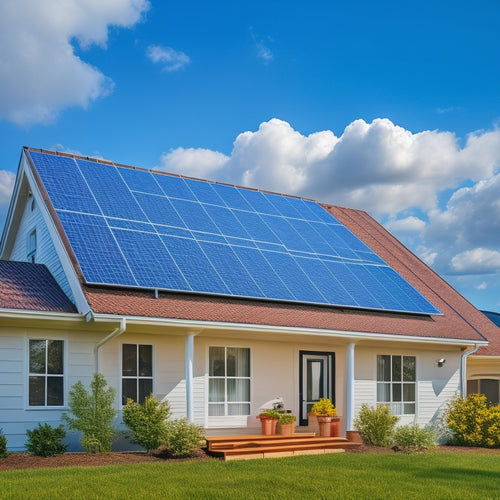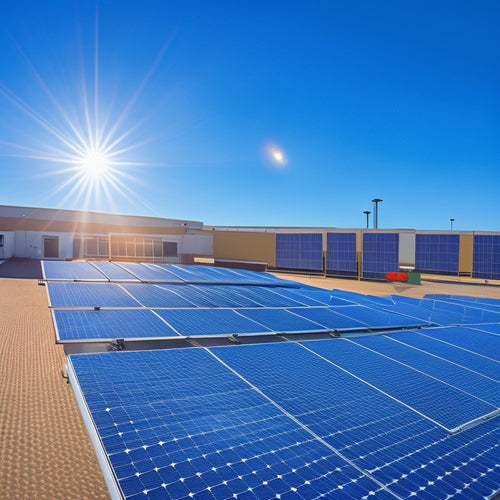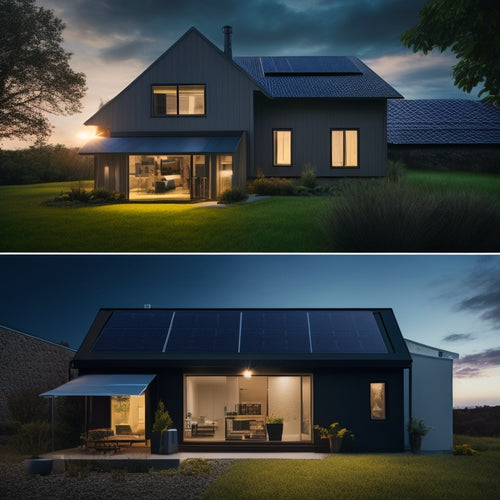
Benefits of Solar Battery Storage for Homeowners
Share
Solar battery storage enables you by enhancing your energy independence and providing reliable backup power. You'll enjoy reduced energy bills as you can store excess solar energy for later use, particularly during peak hours. This system not only safeguards against grid outages but also promotes emergency preparedness, ensuring your essential appliances run smoothly. With various incentives available, the initial investment becomes more manageable, leading to greater long-term savings. Plus, modern batteries boast improved durability and less maintenance. If you're curious about optimizing your setup, further knowledge can guide your path to a sustainable energy solution.
At a Glance
- Solar battery storage enhances energy independence, reducing reliance on the grid and protecting against fluctuating energy prices.
- It provides reliable backup power during outages, ensuring essential appliances remain operational.
- Homeowners can save on energy costs through effective management and utilization of stored solar energy.
- Various incentives and rebates can significantly lower the initial investment for solar battery systems.
- Modern solar batteries offer enhanced durability, requiring less maintenance and performing well in extreme conditions.
Energy Independence Assurance
When you invest in solar battery storage, you greatly reduce your reliance on the grid, giving you greater control over your energy supply.
This independence not only enhances your energy security but also guarantees you have backup power during outages, keeping your home running smoothly.
Ultimately, you're not just saving on energy costs; you're also safeguarding your future against unpredictable disruptions.
Reduced Reliance on Grid
Solar battery storage appreciably improves your ability to operate independently from the grid, ensuring energy security and stability. By investing in solar battery systems, you can considerably reduce your reliance on traditional power sources, enhancing your grid resilience.
This independence not only protects you from fluctuating energy prices but also enables you to exploit renewable energy efficiently.
With energy optimization at the forefront of your priorities, solar batteries allow you to store excess energy produced during sunny days for use during peak hours or cloudy periods. This means you can maximize your solar investment, ensuring that every kilowatt-hour generated is applied effectively.
As a homeowner seeking greater autonomy, you'll appreciate the control it gives you over your energy consumption.
Moreover, reducing your dependence on the grid aligns with a broader vision of sustainability. By relying on your own energy production, you contribute to a cleaner environment while safeguarding yourself against potential energy shortages.
The freedom that comes from knowing you can power your home independently isn't just a luxury—it's a smart, strategic decision for a resilient future. Accept this energy independence and take charge of your energy destiny today.
Backup Power During Outages
Investing in solar battery storage not only enhances your energy independence but also provides a reliable backup power source during outages. When the grid goes down, your solar battery kicks in, ensuring you stay powered up. This capability is essential for emergency preparedness, allowing you to keep essential appliances running—like refrigerators, medical devices, and lights—while others are left in the dark.
By integrating renewable energy sources with storage solutions, you create a self-sustaining system that enables you to take control of your energy needs. This independence means you're less vulnerable to rising electricity costs and unpredictable outages sparked by extreme weather or grid failures.
With your solar battery, you're not just relying on the grid; you're utilizing the sun's energy to maintain your daily life, even when external circumstances disrupt it.
Moreover, having a backup system in place promotes peace of mind. You can confidently face outages, knowing you've equipped your home for resilience. In a world where energy security is increasingly important, solar battery storage is an investment in your freedom and stability.
Don't just prepare for emergencies—thrive through them.
Cost Savings Over Time
When you invest in solar battery storage, you start seeing reduced energy bills almost immediately.
This is particularly true as effective energy management optimizes storage and consumption.
Additionally, various incentives and rebates can greatly offset your initial costs, enhancing your savings over time.
This combination not only makes solar battery storage a financially savvy choice but also contributes to long-term economic benefits.
Reduced Energy Bills
While many homeowners seek renewable energy solutions for environmental benefits, one of the most persuasive reasons to evaluate solar battery storage is the potential for considerably reduced energy bills. By utilizing solar energy and storing it efficiently, you can minimize your reliance on the grid, particularly during peak hours when electricity prices soar.
Investing in solar battery storage allows you to optimize solar efficiency, ensuring that the energy collected during the day is used effectively. Different battery types, such as lithium-ion and lead-acid, offer varying performance levels and lifespans, impacting your overall savings. Choosing the right type can lead to significant long-term cost reductions.
When you store excess energy generated by your solar panels, you can use it during times when the sun isn't shining, thereby reducing your energy costs. Over time, these savings can accumulate, leading to a notable decrease in your monthly bills.
Additionally, this independence from traditional energy sources enables you, allowing you to take control of your energy consumption. Ultimately, adopting solar battery storage isn't just about saving money; it's about embracing a future where you're less dependent on fluctuating energy prices.
Incentives and Rebates
Steering through the world of solar battery storage can be made easier with the variety of incentives and rebates available, which greatly improve cost savings over time. By taking advantage of federal incentives and state rebates, you can markedly reduce your initial investment.
Tax credits can further strengthen your savings, allowing you to reclaim a portion of your expenses when filing taxes.
Many homeowners overlook the financing options that can make solar installations more accessible. With low-interest loans and flexible payment plans, you can spread out costs while enjoying the benefits of energy independence.
Additionally, installation grants may exist in your area, providing even more financial relief.
Don't forget about solar incentives like energy credits, which allow you to earn money for the excess energy your system produces. These credits can offset your energy bills, improving your overall savings.
Ultimately, these financial benefits don't just save you money; they also contribute to environmental benefits by promoting sustainable energy.
Key Specifications Overview
When considering solar battery storage, you'll want to focus on key specifications like capacity and power output, as these directly impact your energy efficiency.
Higher capacity systems, such as those rated at 10 kWh or larger, can support essential appliances for longer durations during power outages, providing backup capacity information.
Additionally, understanding the lifespan and warranty terms can help you make an informed investment that safeguards your financial future.
Evaluating these factors guarantees you maximize the benefits of your solar energy system.
Capacity and Power Output
Understanding the capacity and power output of solar battery storage is vital for maximizing your energy efficiency.
Capacity refers to how much energy a battery can store, measured in kilowatt-hours (kWh). The greater the capacity, the more energy you can utilize from your solar technology, allowing you to power your home during low sunlight hours or outages.
Power output, on the other hand, measures how quickly the battery can deliver that stored energy, typically expressed in kilowatts (kW). This factor is significant when you need to meet high energy demands, such as during peak usage times.
When selecting a solar battery, consider both specifications carefully. A battery with a high capacity but low power output may not efficiently support your home's energy needs during peak times.
Conversely, a high power output with low capacity could lead to frequent discharges, limiting your energy independence.
Lifespan and Warranty Terms
Your solar battery's lifespan and warranty terms are essential factors that directly impact your investment's value and reliability. Most solar batteries have a lifespan ranging from 5 to 15 years, depending on the technology used. Lithium-ion batteries typically offer longer life and better performance, making them a popular choice among homeowners seeking independence from the grid.
When considering installation, it's important to evaluate your battery's warranty terms. A standard warranty might cover a certain number of cycles or years, so understanding these details helps guarantee you're making a sound investment. Ideally, you want a warranty that assures performance for the expected lifespan, providing peace of mind.
Moreover, proper maintenance practices can greatly influence your battery's longevity. Regularly checking connections, guaranteeing adequate ventilation, and monitoring temperature can help you maximize your battery's lifespan. By investing time in proper upkeep, you not only protect your investment but also enhance your energy independence.
Ultimately, selecting a solar battery with a strong lifespan and favorable warranty terms enables you to make the most of your renewable energy system. Embracing these aspects helps you secure a sustainable, reliable energy future.
Selecting Based on Capacity Requirements
When selecting a solar battery, it's essential to understand your energy needs to guarantee you're making the right choice.
By estimating the battery size based on your consumption patterns, you can optimize your solar system's performance and efficiency.
This strategic approach not only maximizes your energy independence but also enhances your long-term savings.
Additionally, consider conducting a thorough load analysis for appliances to better inform your battery selection.
Understanding Energy Needs
How can you determine the right battery storage capacity for your home? It starts with a clear understanding of your energy consumption and usage patterns. Consider how much energy you typically use daily and during peak times. This knowledge enables you to choose a battery that meets your needs without overcommitting resources.
Here's a simple breakdown to help assess your requirements:
| Energy Usage Type | Daily Consumption (kWh) |
|---|---|
| Essential Appliances | 15 |
| Heating/Cooling | 10 |
| Miscellaneous | 5 |
Your essential appliances might require around 15 kWh, while heating and cooling systems could add up to 10 kWh. The miscellaneous category, covering lights and devices, often accounts for about 5 kWh.
Estimating Battery Size
Once you have a solid grasp of your energy consumption, estimating the right battery size becomes a straightforward process.
Start by determining your daily energy needs in kilowatt-hours (kWh). This figure will guide your decision, as it reflects how much energy you'll require during outages or low sunlight periods.
Next, consider the battery chemistry. Different chemistries, like lithium-ion or lead-acid, offer varied capacities and lifespans, influencing your choice.
Lithium-ion batteries, for example, tend to have a higher energy density and longer life, which can be more cost-effective in the long run despite higher upfront costs.
Don't forget to evaluate your installation options. Will the battery be used solely for backup, or do you want it integrated into your solar system for daily use?
Understanding the purpose of your battery helps in selecting one with the right capacity.
Longer Lifespan Than Traditional Batteries
When you invest in solar battery storage, you're not just gaining energy efficiency; you're also choosing enhanced durability and reliability.
These advanced batteries typically outlast traditional options, giving you more value over time.
Enhanced Durability and Reliability
As you investigate solar battery storage options, it's essential to recognize that these systems often boast greater durability and reliability compared to traditional batteries. This enhanced performance stems from significant technology advancements in battery design and materials.
Unlike conventional batteries, solar battery systems are engineered to withstand extreme weather conditions and prolonged usage, making them a more resilient choice for homeowners seeking energy independence.
Moreover, the longer lifespan of solar batteries means fewer replacements, ultimately saving you money in the long run. While some maintenance considerations exist, innovations have minimized these needs. Many modern solar batteries are designed with self-monitoring features, allowing you to easily track performance without constant oversight.
This reliability translates to peace of mind and freedom from the unpredictability of traditional power sources. You're not just investing in a battery; you're opting for a sustainable, efficient energy solution that aligns with your values.
Frequently Asked Questions
How Do Solar Batteries Impact Home Resale Value?
Solar batteries can enhance your home value by showcasing energy independence and sustainability. They represent a smart investment potential, appealing to eco-conscious buyers who appreciate reduced energy costs and increased resilience against power outages.
Are There Tax Incentives for Installing Solar Battery Systems?
Yes, you can find tax incentives for installing solar battery systems. These incentives often help offset installation costs, increasing tax credit eligibility. By taking advantage, you enhance your freedom in energy management while saving money.
Can Solar Batteries Power My Home During a Blackout?
Imagine a lighthouse guiding you through a storm. Yes, solar batteries can power your home during a blackout, providing energy independence and blackout preparedness. They guarantee your lights stay on, even when the world goes dark.
What Maintenance Do Solar Batteries Require Over Time?
Solar batteries require minimal maintenance over time. You should monitor their battery lifespan and charging cycles regularly, ensuring ideal performance. This proactive approach maximizes efficiency, giving you the energy independence you desire during outages or peak demand.
How Do Weather Conditions Affect Solar Battery Performance?
Weather conditions considerably affect solar battery performance. Extreme temperature effects can reduce efficiency, while high humidity impact may lead to corrosion. Understanding these factors helps you optimize your system, ensuring you utilize maximum energy freedom.
Explore More
Incorporating solar battery storage into your home is like planting a tree that bears fruit for years to come. You gain energy independence, save money over time, and enjoy a longer-lasting solution compared to traditional batteries. Just as a sturdy tree provides shade and shelter, your solar system offers security against rising energy costs. By choosing the right capacity, you're not just investing in a battery; you're nurturing a sustainable future for yourself and your family.
Related Posts
-

Cost of Solar Panel Installation
You can expect to pay between $15,000 and $30,000 or more for a typical solar panel installation, depending on the sy...
-

Essential Solar Panel Mounts for Commercial Properties
When it comes to essential solar panel mounts for your commercial property, durability and wind resistance are key fa...
-

Cost of Home Solar Battery
You're looking to invest in a home solar battery to reduce your grid reliance, but you're curious about the cost. The...


